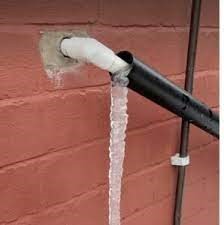Plumbing
Pipes can freeze in cold weather. To help prevent this, run your heating regularly even on a low temperature and run water through your taps can help prevent frozen pipes.
If you are away from your home, let your central heating come on at regular intervals (set your timer) to help keep pipes warm.
If you have a burst pipe, turn off your water if you can and contact us on 0113 386 1000 or email:
hello@leedsfed.com so that we can help.
If you have a leak, here's how to isolate it using the stop tap:
Stop taps are used to control the water flow of the mains cold water into your home. To turn it off you turn the tap in a clockwise direction which will shut of the water supply. Please note that there may be some residual water that is still in the pipes which still may leak.
Do you know where your stop tap is?
They are normally found in kitchens below the sink unit or in a bathroom. It is important to know where your stop tap is for any leaks or burst pipes - don’t leave until you have an emergency to find your stop tap. We have a video you can watch about how to use the stop tap
here.
Central Heating (Frozen Condensate pipe)
During the winter months cold spells may cause your heating to stop working. This may be due to the condensate pipe becoming frozen.

Turn off your boiler for safety (this is to prevent any further condensation building up in the pipe) if you can
2 Locate the condensate pipe and the section of pipe that is frozen. The condensate pipe will be located on the exterior wall and is plastic
3 To try and defrost the pipe you can try the following:
- Wrap a towel soaked in hot water around the frozen section of the pipe or put a hot water bottle on the frozen pipe. Leave these in position and this will gradually thaw the pipe.
- You can gradually pour hot water over the pipe to help melt the frozen section. It’s important to do this slowly and safely to avoid any injury to yourself or damage to the pipe (DO NOT use boiling water)
4 Once the pipe has thawed, the water will start to flow and you can then re-start your boiler
WARNING
- Do not disconnect the condensate pipe
- Make sure that you stand at ground level when pouring water onto the pipe (do not reach or climb to a high level)
- Do not use water that is too hot
- Do not rush thawing the pipe
- Use suitable protection for your hands when using hot water
- When using water in cold weather be careful as this may freeze and become a slip hazard
How to keep your home and yourself warm in cold weather
- Check your heating is working if you haven’t used this for a while, turn it on for at least 20-30 minutes and check all radiators are heating up correctly
- The recommended temperature for a living room and bathroom is 18-21c
- By turning down your thermostat by 1 degree you can save on heating costs
- Radiators with thermostatic valves can be turned down or off in rooms you are not using
- Occasionally rooms will need to be heated to avoid the risk of condensation or mould growth forming. You can read more on our website.
- Use draught excluders on doors to keep the heat in the room
- Close your blinds and curtains at dusk to keep in heat
- Any devices that are not being used can be unplugged as they will still use energy in standby mode
- Make sure you have sufficient credit on your gas and electric meters (if you top up)
- Have a hot water bottle and/or blanket to hand
- Use several layers of clothing instead of one thick item of clothing
- If going out, gloves, hats and scarves can make a real difference
- Have regular warm drinks and at least one hot meal a day and eat at regular intervals as this will help keep your energy levels up during the cold weather in winter
- Have sand or salt to hand to put on icy paths and steps
- Keep simple cold and flu remedies in your house
Electrical equipment
Check all internal and external lighting to they are in working order (keep some spare bulbs)
Keep a torch handy in cases of power cuts
Keep spare batteries for pendant, smoke alarms and thermostats
Our repairs service
In bad and extreme weather conditions it may be that we have to re-arrange pre-arranged appointments and delays could happen- please be patient with our engineers.
We may have to revert to an emergency service only due to extreme weather conditions. An emergency repair is where there is an immediate risk to life and/or danger to a property- for example, a major electrical failure (not a power cut), exposed live electrical wire or several leaks which cannot be contained.
Report emergency repairs by phoning 0113 3861000 and then choosing option 2 when asked.
We ask that you try to avoid phoning to book a routine repair in when there are extreme weather conditions